
by Natalie Devitt
Last month I questioned whether it was worth the average person’s time to watch The Outer Limits. Sure, The Architects of Fear was a great episode, but all of the other episodes during the show’s first month on the air were not nearly as strong. After continuing to watch the program for yet another month, I finally have reached a verdict, and the answer yes. The Outer Limits really seems to come into its own this month. Allow me to explain.
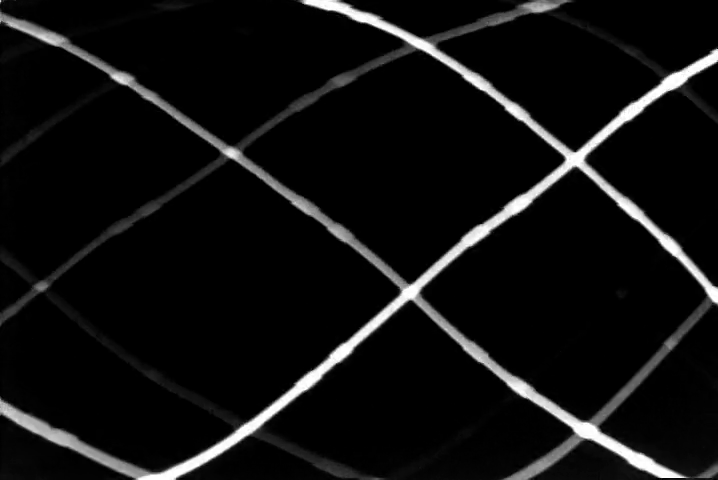
The Sixth Finger, by Ellis St. Joseph
In The Sixth Finger, Edward Mulhare stars as a scientist named Professor Mathers, who has developed a process that he hopes will improve the fate of mankind. The scientist hypothesizes that by speeding up man’s evolution that man will somehow become so intelligent that he will become more peaceful. Of course, the plan goes haywire when Mathers actually tests his hypothesis out on a real human subject. David McCallum, who you may have recently seen in The Great Escape, plays Gwyllm Griffiths, a miner who volunteers to be a test subject for Mathers. Shortly after the process begins, Mathers realizes that Griffiths is not only becoming smarter at a speed much faster than he ever could have predicted, but also that Griffiths has begun undergoing a number of physical transformations, including growing a sixth finger. Also, as time passes, Griffiths becomes more and more difficult to control.
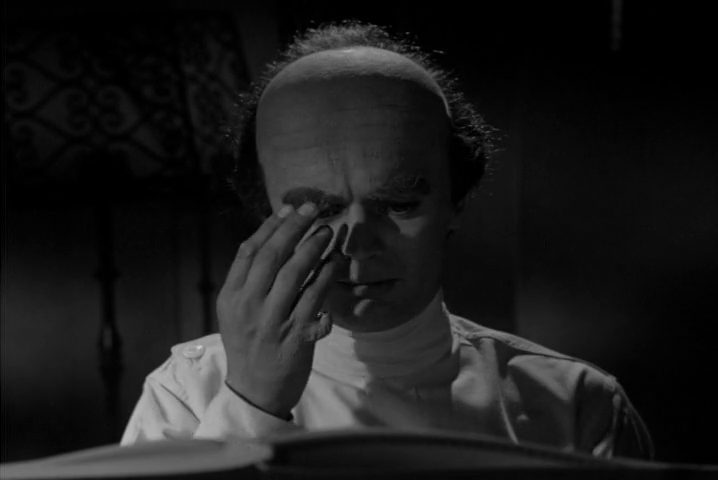
This is the first very satisfying episode of The Outer Limits since The Architects of Fear. Part of what made both episodes so effective was the special effects makeup. Similar to The Architects of Fear, an actor in The Sixth Finger undergoes a pretty impressive transformation over the course of the episode. In this case, Griffiths’ hair thins while his skull increases in size. His ears take on more of a pointed shape, and let’s not forget the finger referenced in the episode’s title.
While I am sure the novelty may wear off at some point, I am finding myself a little excited to see what kind of alien or monster is going to be at the center of each week’s story. The creations made for The Outer Limits may not be quite level of some of Jack Pierce’s makeup for Universal’s movie monsters, like Frankenstein or the Wolfman, but they certainly are unique and ambitious for a weekly show. This is a case where great makeup really helps an already strong story reach its true potential. The Sixth Finger easily earns three and a half stars.
The Man Who Was Never Born, by Anthony Lawrence
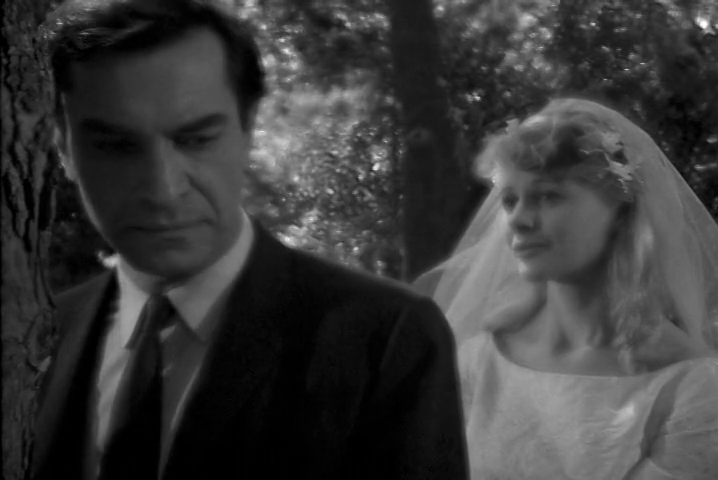
The Man Who Was Never Born is about Joseph Reardon, an astronaut who accidentally drives his spacecraft thorough a time portal into the future. In the year 2148, he lands and realizes that much of Earth’s population has been almost entirely wiped out. The one survivor he does meet is a disfigured man named Andro. Andro is played by none other than North by Northwest actor Martin Landau, an actor who I am sure viewers of The Twilight Zone are very familiar with, having starred in Mr. Denton on Doomsday. He and Joseph decide to go back in time to stop the scientist responsible for creating Andro’s disfiguring disease, which left him looking a bit like Lon Chaney Sr. or Charles Laughton in the 1923 and 1939 versions of The Hunchback of Notre Dame.
I know, the premise sounds similar to just about any plot on The Twilight Zone. A recent story such as No Time Like the Past could come to mind. So, if you are thinking this is yet another run-of-the mill time travel tale, you’re in for a pleasant surprise. An episode with a familiar beginning suddenly turns into a surprisingly good retelling of Beauty and the Beast, which I must admit I never saw coming.
What really sets this episode apart is its impressive cinematography, which was clearly inspired by Jean Cocteau’s 1946 adaptation of the story. The Outer Limits’ take on the classic fairy tale also utilizes a lot of point-of-view shots. Each shot is very expressionist, so how Andro is shot differs greatly; depending on who is looking at him and their feelings towards him. The classic Hollywood high-key lighting, shots with Vaseline on the lens and the use of images superimposed on top of one another make the viewer feel like they are actually inside a fairy tale. The whole thing concludes with a very striking shot. The Man Who Was Never Born is a feast for the eyes, which is why I give this entry in the series four stars.
O.B.I.T., by Meyer Dolinsky
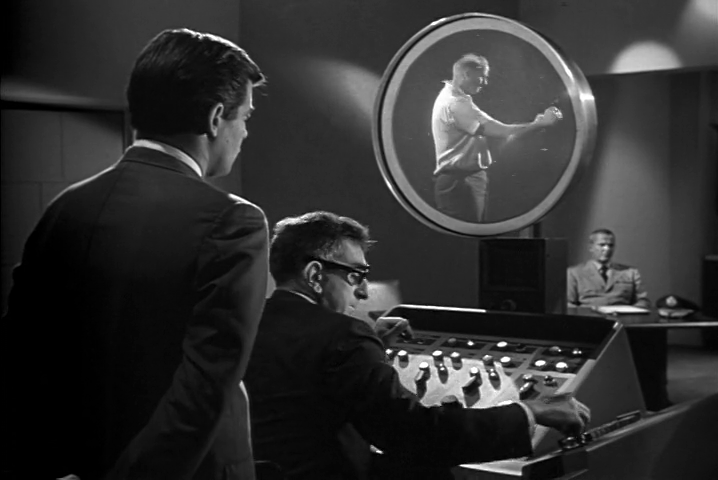
Senator Orville, played by Maverick actor Peter Breck, is investigating a murder that took place at a military base. While conducting his investigation, Orville begins to uncover what seems to be a poor work environment. Behind the work-place drama, he finds a machine called O.B.I.T., which stands for Outer Band Individuated Teletracer. O.B.I.T. not only tracks employees on the base, but also records anyone within a five hundred mile radius without their consent or knowledge. As troubling as that is, that is not the worst of it. Those who use it, cannot stop using it. One user describes the machine by saying, “No one can joke or laugh. It watches. Worst of all, I watch it. I can’t stop. It’s like a drug, a horrible drug. I can’t resist it. It’s an addiction.”
Initially, O.B.I.T. seemed more like something you would find on Perry Mason rather than on The Outer Limits. Not being a big fan of courtroom dramas myself, I was not terribly interested, but when the plot started to feel more like a George Orwell novel, I suddenly felt more engaged as a viewer.O.B.I.T. is not very visually stimulating; it is an episode that really is carried by the strength of its script and the ideas contained in the script. This is an episode that stayed with me, and it became more disturbing, the more I thought about it. For me, the total erosion of privacy is terrifying because it is something that could actually happen, but O.B.I.T. is interesting whether or not you subscribe to the belief that people with nothing to hide have nothing to fear. I give O.B.I.T. three and half stars.
The Human Factor, by David Duncan
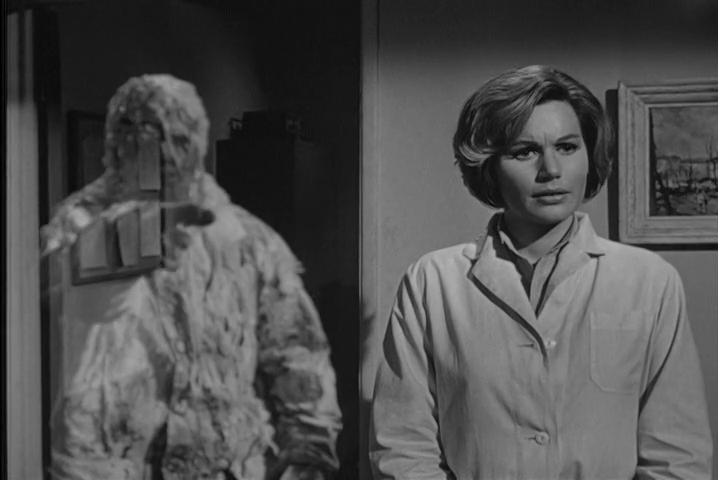
The Human Factor takes place on a remote outpost in Greenland. One of the people at the outpost is Major Brothers, played by Houseboat actor Harry Guardino, a man who feels responsible for the death of one of his soldiers. A soldier who Brothers thinks may have returned to haunt him as a ghost. Major Brothers’ goes through great lengths to rid himself of hallucinations, and ends up paying a visit to Doctor Hamilton. Doctor Hamilton, played by All About Eve actor Gary Merrill, has recently created a device to help him read other people’s thoughts. Doctor Hamilton tries to use the machine on Brothers, only for things to not go as planned. The two men end up accidentally switching minds. Brothers is now in Hamilton’s body and poses a threat to those around him. Unfortunately, nobody will believe Doctor Hamilton, who is stuck in Brothers’ body.
The Human Factor is only fair. The acting is more than good enough, but without a strong story, the episode goes nowhere. On the surface, the episode has a little bit of something for everyone, including action and romance, but the whole thing really struggled to maintain suspense and my attention for the full hour. Sadly, the brief glimpses of the ghost haunting Major Brothers were the only moments of excitement for me. As a result, I can only give it two stars.
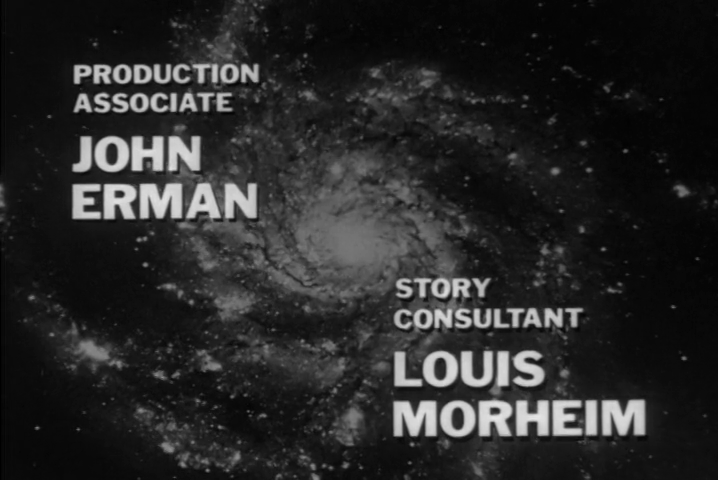
If this past month is any indication of where the show is headed, I am very excited. So, if you have not turned into The Outer Limits yet, I highly recommend you start. As the opening monologue says, “Experience the awe and the mystery which reaches from the inner mind to – The Outer Limits.”
[New to the Journey? Read this for a brief introduction!]

![[November 15, 1963] A Sign of Things to Come? (<i>The Outer Limits</i>, Episodes 5-8)](https://galacticjourney.org/wp-content/uploads/2018/11/631115c-672x372.png)
